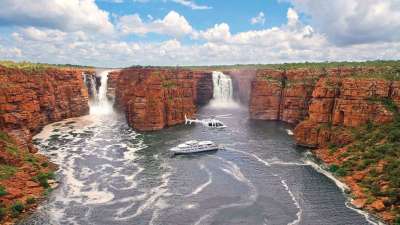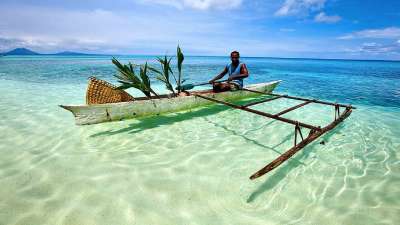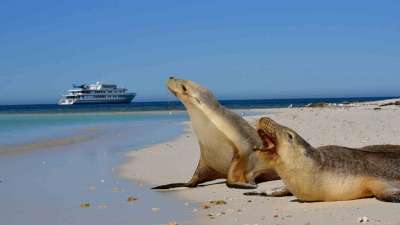At a Glance
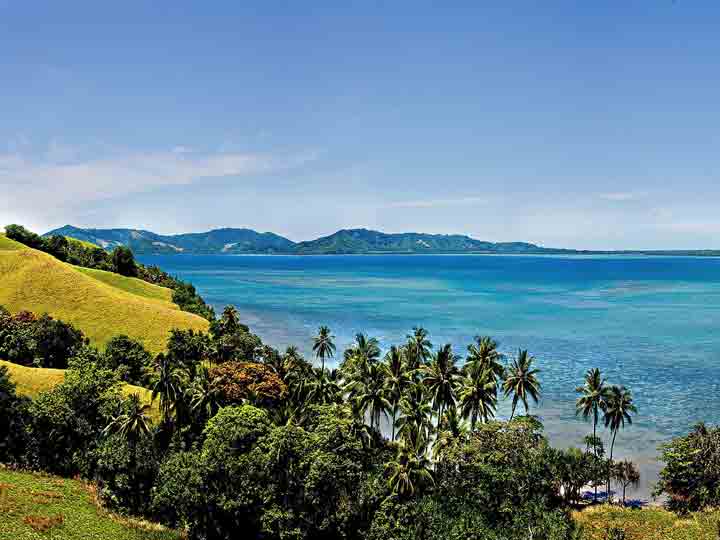
Route: Cairns - Kavieng - Madang - Cairns (Route 1); Cairns - Madang - Kavieng - Cairns (Route 2)
The Sepik Soiree is a voyage of contrast, from the freshwater lakes of the mighty Sepik River to the turquoise blues of Hermit Atoll and the towering jungle volcanoes on Bagabag Island. Explore the remote Admiralty Islands, snorkel and dive pristine areas of coral that are rarely visited. The Bismarck Sea lies in the centre of the famed Coral Triangle and offers extraordinary water clarity and a kaleidoscope of fishes and corals. Sport fishermen will share the excitement with regular hook-ups on sailfish, black marlin and wahoo as well as the opportunity to entice the revered Papuan black bass. Encounter the mysterious Sepik River on a Sepik River cruise – a 100km ...
Trip Highlights
|
|
What's Included
- Return charter flights ex Cairns.
- Inclusive of all meals, water and land based activities (e.g fishing, snorkelling, diving, sightseeing, exploring etc), non-alcoholic beverages and local transfers to/from the vessel.
- Scenic helicopter flights and alcoholic beverages are NOT included and can be purchased in addition to the cruise fare on-board.
Itinerary
|
Start Your “welcome aboard” is in the vibrant city of Cairns. One of our crew members will escort you aboard the luxury cruise’s very own charter aircraft! Now sit back and enjoy the comfortable flight to Kavieng. Kavieng is the capital of the Papua New Guinean province of New Ireland. As soon as you step off the plane you will begin to reshape your impressions of the “land of the unexpected”. Perhaps the clean and fresh sea breezes will take you by surprise, or will it be the huge smiles of locals so eager to welcome you to their island paradise. After clearing customs, we will transfer you to the on - board luxury of the cruise and, the delights of our renowned galley. Enjoy a welcome aboard lunch before we visit a local island resort. |
|
The many islands around Kavieng and New Hanover are a cruise highlight. A morning sing sing will be a memorable event as every man, woman and child turns out in welcome. Off the beach we find ships, planes and even submarines wrecked in shallow water and beyond the reef it’s time to encounter a marauder of another kind! And, what a place for diving and snorkelling! |
|
The Vitu Islands are a volcanic group with an area of 96 km2 located in the Bismarck Archipelago. Formerly called the French Islands, the group is also sometimes known as the Witu Islands. The islands are volcanic ocean peaks and although they are reef-ringed, they are not atolls and therefore highly fertile. The group is the chief copra centre of Papua New Guinea, although the main crop harvested is now cocoa (due to the depressed prices available for copra). Garove [or Big Witu] and Unea [Bali] are the largest islands. When the Germans were expulsed post World War I the island group was acquired by the trading group Burns Philp. Langu Plantation was ceded by Burns Philp to the Coote family after World War II as compensation following the execution of their family head (and Burns Philp store manager) by the Japanese after he refused to give the invaders keys to Burns Philp’s facilities in Rabaul. The Perhafen mission was established inside the caldera which forms the bulk of Garove, a wise choice considering the island’s exposure to sea state – the island comprising at places only the precipitous higher ground of the caldera rim. The helicopter will provide a bird’s eye view of the entire island group whilst the ship’s expedition boats will deliver guests ashore for historical and cultural tours. And the surrounding reef will lure the fishers, snorkellers and divers. Vitu’s remote coral reefs remain largely unexplored. Few divers have visited this area and many reefs remain un-dived. The visibility is usually superb and pelagic fishes are abundant. Grey reef sharks, silvertip sharks, dog-tooth tuna, rainbow runners and barracuda are seen on most dives. The fish assemblages on these reefs are distinctly oceanic in composition and a number of species that are rare closer inshore are very abundant here. |
|
This morning we wake in Manus Province – very few travellers make it to this remote part of Papua New Guinea. The province consists of several island groups including the Horno Islands, the Admiralty Islands (including Manus Island), the Hermit Islands, Ninigo Islands and Wuvulu Island. The combined land area of the province is just 2,100 square kilometres however 220,000 square kilometres of sparkling sea surrounds! Some 45,000 people live within the province boundaries. The name Manus is a traditional name for a group of fishing people who inhabit the coastal areas of Manus Island. The name differentiates them from other groups with differing customs and languages. These people were seafarers and traders. The area is renowned for scuba diving and features colourful marine life, coral reefs, shipwrecks, and clear water. During the morning we visit the island of Rambutyo – the second largest island (after Manus) in the Admiralty Islands. The island lies 40 kilometres to the southeast of Manus and here we hope to encounter traditional garamut (split drum) dancers. There will also be opportunity for some short walks and, spectacular helicopter flights over the island group. In the afternoon we will move to the northern end of Rambutyo – the fringing reefs here are amongst some of the most spectacular we see anywhere in PNG with very high coral cover and spectacular walls dropping into deep water. The mosaic of small islands in the area offers a wonderful backdrop and provides a wide range of different habitats to explore. Oceanic currents move gently through the passes allowing us a free ride as we observe the amazing biodiversity of these marine communities. Sailfish are also caught in the surrounding waters. |
|
An entire day devoted to beautiful Ponam Island. Ponam played a major role in World War II. The island was occupied by Japanese forces in 1942 and retaken by Allied forces in 1944. American “Seabees” immediately constructed an airfield which was then handed over to the British Royal Navy. The British named the airfield HMS Nabaron and used it as a forward operations base. After encountering the enemy, it was not uncommon for damaged aircraft to crash when attempting to land and today the wreckage of several planes can be found in the surrounding waters. Of particular interest is Ensign Jensen’s plane. The naval flyer was the only pilot to report a full-strength Japanese convoy that would have otherwise remained undetected. Unfortunately he was later killed when his plane crashed during a take-off from Ponam and the wreckage can be seen in a lagoon on the east side of the island. The terrestrial remnants of HMS Nabaron should attract the attention of our shore parties whilst the snorkelers will be keen to explore the plentiful bommies and coral outcrops found inside the Manus Barrier Reef. Coral cover is high and brightly coloured butterflyfish and parrotfish are common. Game fishing for marlin, yellow fin tuna, trevally and mackerel is possible and bottom fishing can produce quality catches of snapper. Ponam is adjacent to the longest coral reef in Manus Province providing plenty of opportunity for SCUBA diving. The ship’s helicopter will again swing into action offering a unique prospective of the island’s many lagoons and, nearby Manus Island. There may even be time for a romantic stroll along your very own beach complete with coconut palms and a shimmering South Pacific sunset. |
|
Today we begin to visit a region that was highly rated by the underwater explorer Jean-Michel Cousteau. The Hermit Islands form a 22 kilometre long barrier reef. They are renowned for their clam gardens and the snorkelling is truly spectacular. The gently sloping reef edge disappears into the blue depths with visibility usually exceeding 40m, allowing us excellent views of the marine life that inhabits the reef edge. Sharks, manta rays, turtles and large schools of barracuda and trevally all reside here along with the usual array of colourful reef fishes and invertebrates. For the divers – The Hermits also feature incredible reef formations where large schools of mobula rays, snapper, trevally and grey reef sharks are encountered! Fresh ocean currents also make for rip-roaring dives in channels chocked with giant sea fans and soft coral formations. Marlin and sailfish are also known to occur and hopefully the hikers will catch a glimpse of deer introduced by German colonists. In the afternoon the expedition boats will land at Luf Island – the only inhabited island in the Hermits. Join the crew as we meet the locals and experience local village life. |
|
The Ninigo Islands are a large open-atoll structure surrounded by several smaller atoll formations. In total there are 7 atolls with around 50 small islets – plenty of opportunity for exploration. The largest component of islands forms a 34 km long by 18 km wide atoll that is open on its western side. The major island within the group is Mal, located at the southern end of the outer reef. The diving here is some of the best encountered in PNG. We will endeavour to explore as many of these picture-perfect islands as we can and it’s likely that the day will be filled with magical snorkelling and diving experiences, leviathan struggles with rod and reel, exhilarating dips in the crystal clear lagoons and romantic strolls along the ever-present palm fringed beaches. |
|
The Sepik – as far as adventure is concerned, it doesn’t get much better. Just the name conjures up excitement. The Sepik River is the longest river in Papua New Guinea and, one of the great river systems of the world. It has a large catchment area and supports numerous landforms including swamplands, tropical rainforests and mountains. Biologically, the river system is possibly the largest uncontaminated freshwater wetland system in the Asia-Pacific region. The river’s total length is 1,126 kilometres and it has a drainage basin of over 80,000 square kilometres! There is a 5 -10 kilometer wide belt of active meanders along most of the river’s course and a floodplain up to 70 kilometers wide includes extensive backwater swamps. However, unlike many other large river systems, the Sepik has no delta – it flows straight into the sea. The entire Sepik basin remains a largely undisturbed environment – there are no major urban settlements or mining and forestry activities in the river catchment. Local villagers have lived along the river for many millennia and the river has formed the basis for food, transport and culture. European contact with the river started in just 1885 when German colonists first explored the area. In 1886 and 1887, further expeditions by steam boat were conducted by the Germans and over 600 kilometers of riverine was explored. Between 1912 and 1913 the Germans sent further expeditions to explore the river and surrounding areas. They collected flora and fauna, studied local tribes and produced the first maps. The station town of Angoram was established as a base on the lower Sepik for explorations, but with the beginning of World War I, exploration ceased. The Japanese held the area throughout most of the Second World War. By the end of the war the Japanese had been completely surrounded however, the battle to defeat the remaining forces was hard fought and drawn out due to the terrain. The Sepik is revered for its art. The tribes living along the river produce magnificent wood carvings and artful clay pottery. Many tribes use garamut drums in rituals; the drums are formed from long, hollowed out tree trunks carved into the shape of various totem animals. As part of an elaborate coming of age ceremony, young men are scarified with the image of a crocodile on the river bank. The cruise will arrive at the mouth of the Sepik at first light before proceeding on a 70 nautical mile Sepik River cruise. Then it’s away in the expedition boats and the helicopter for days filled with exploration and discovery. Witness an elaborate coming of age ceremony where young men are scarified in the image of the crocodile. Other highlights include the township of Angoram – here the waterside market presents as a fantastic opportunity to purchase local carvings. At Kambaraumba village we will be greeted by a sing sing featuring giant crocodile puppets that gyrate through crowds of dancers and drummers – truly a feast for the senses! We also explore the maze of swamps and small waterways that lead to Lake Kambaraumba and its stilt village – a community of huts, churches, schools and animal enclosures built above the waters of the lake! |
|
Bagabag Island is a white-sand island offering excellent fishing, snorkelling, and diving. In the morning the expedition boats will survey the outer-reef which is teeming with fish, turtles and dolphins. The area is also renowned for its endless walls of sea fans, pristine corals and large pelagic species. The inshore coral will entertain the snorkelers and there will also be relaxed opportunities for swimming and beachcombing on a Bagabag beach. The ship’s helicopter will also be away again – to explore the sounding area and nearby KarKar Island. Karkar is a larger oval-shaped volcanic island about 25 km in length and 19 km in width. In the centre of the island there is an active volcano with two nested calderas. The latest eruptions on this island occurred in the 1970s. The island has a relatively large population of approximately 50,000. The two main exports from the island are cacao and coconuts, which can grow in the same soil due to height differences. The large plantations are generally family owned. After lunch we’ll go ashore to meet the Bagabag islanders – there are just 4 villages here and apparently the locals are keen to introduce visitors to their unique culture and way of life. The island is rich in betel-nut, local pigs and other food. Life on the island can be quite interesting as there are very few people and they all know each other very well. Then, you will not be able to resist the charms of Christmas Bay – here we can position the cruise within 10 metres of the beach – all ashore for sunset drinks before a farewell dinner to remember! |
|
This morning we are alongside in Madang. Transfer to your charter plane and the return flight to Cairns. We are already looking forward to welcoming you back on-board – the next time you Go Wild in Style! * This itinerary is provided as an example only – prevailing conditions and local arrangements may cause variation. Helicopter flights can be purchased additional to the cruise tariff as a package or individually. |
Dates & Prices
Please contact us for group bookings or private charter.
More Info
- The departure point is Cairns QLD
- Major commercial flights provide convenient access to Cairns
Enjoy a hassle free, seamless transfer to your luxury travel. Private road & charter flight transfers can be arranged. Contact us for your bespoke transfer arrangements.
EXPLORER CLASS STATEROOM
Located on the upper deck – Explorer Class cabins feature a king size double (that can be converted to singles) and a twin basin en-suite. Cabin size is 15 square metres. Other features include large panoramic windows, amenities fridge, in-cabin entertainment and satellite telephone.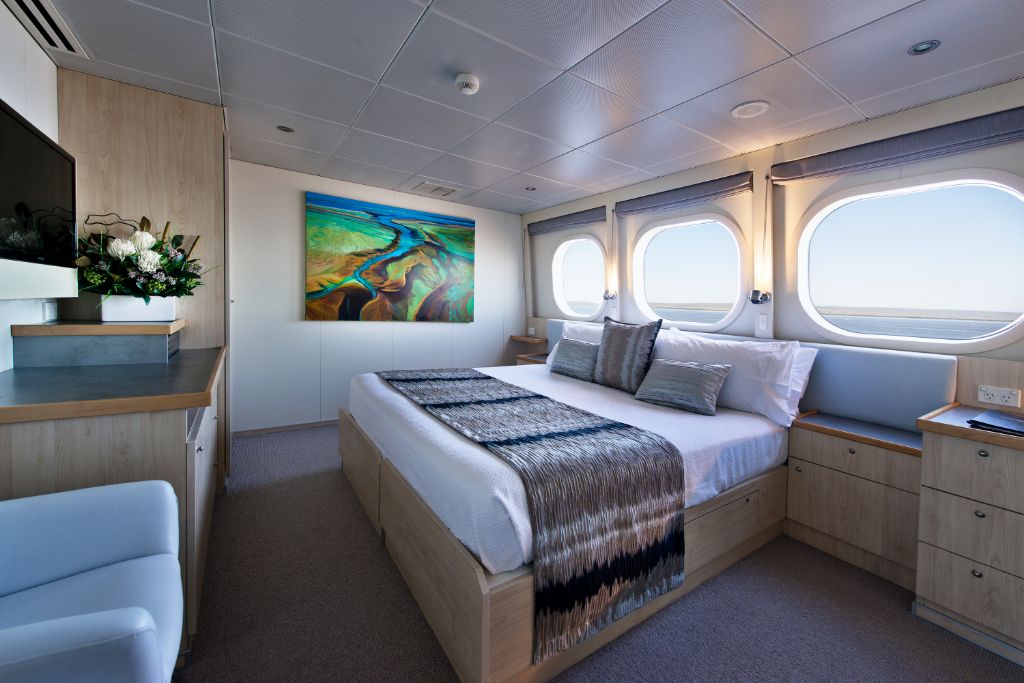
RIVER CLASS DOUBLE
Located on the middle deck – River Class cabins feature a king size double (that can be converted to singles) and en-suite. Cabin size is similar to Explorer Class. Other features include large panoramic windows, in-cabin entertainment and satellite telephone.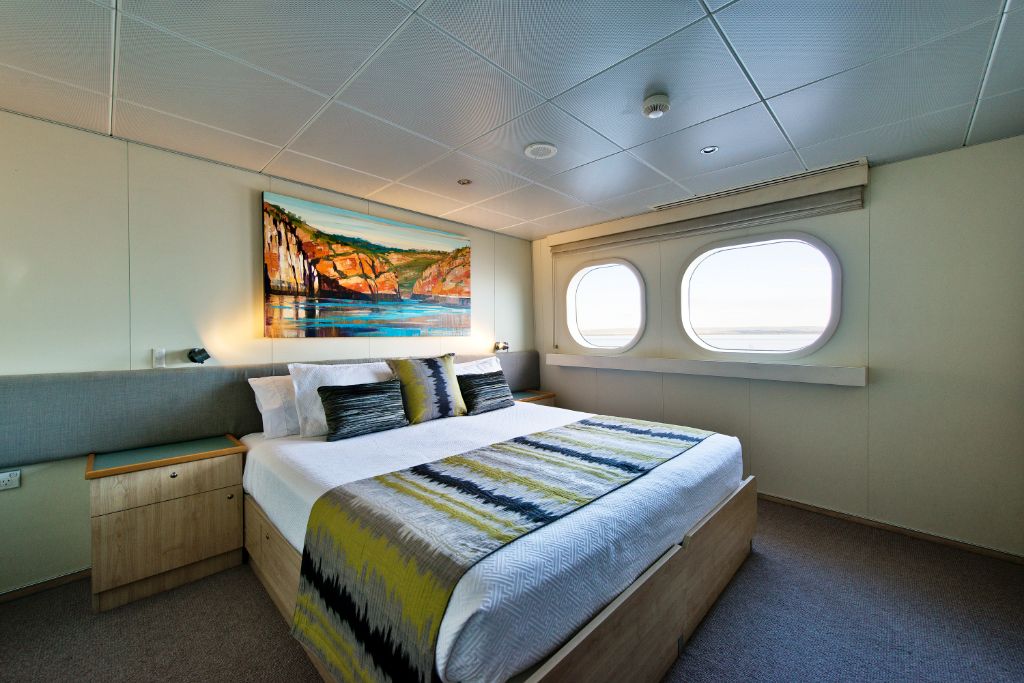
OCEAN CLASS TWIN
Located on the lower deck – Ocean Class cabins feature roomy singles and en-suite. Cabin size is approximately 12 square metres.
Other features include 2 portholes, in-cabin entertainment and satellite telephone.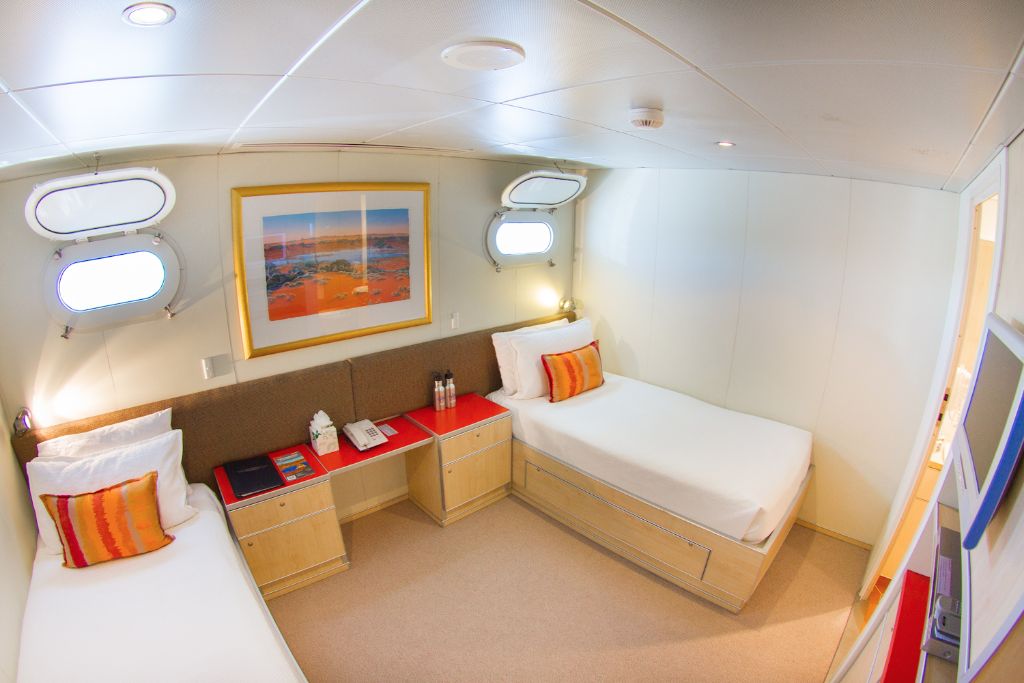
Onlyluxe Travel acts as travel agency and work with different tour operators.
Payment Detail
All pricing is in Australian dollars and are quoted on a per person twin share basis. A supplementary price is available (see below). Bookings are not confirmed until full payment and the signed Booking Form has been received by Onlyluxe Travel.
A non-refundable 30% deposit is payable within 7 days of your booking, with the final balance due 60 days prior to departure. If a booking is made 60 days or less before departure, the full payment is payable immediately. Last minute bookings are payable before arrival. Failure to pay on time may result in automatic cancellation of a booking with cancellation penalties payable to Onlyluxe Travel. If you pay by credit card or PayPal a surcharge will be added to the total price.
Single Supplement
All accommodation is twin share. Single guests will share with someone of the same gender. If a single room is demanded, a supplementary price of will apply. The supplementary price refers to our quotation and needs to be stipulated at the time of booking.
General Cancellation Policies
- Outside of 60 days monies will be refunded less 30% of full fee
- Within 60 days prior to arrival all monies will be forfeited
- No refunds will be given in the event of non-arrival, any unused services or unused nights due to flight or weather disruption
- We strongly recommend guests protect themselves with travel insurance and medical insurance
Please Note: Cancellations must be advised in email and will take effect from the date they are received.
Liability
The participant agrees to indemnify Onlyluxe Travel, and its servant, tour operator and agents, in relation to any liability, loss and damage which the tour operator, or its servants and/or agents may incur as a result of the participants, negligence or misconduct during the tour.
Smoking is not permitted on the bus, or in tents or in other accommodation being used by tour operator at the time that a trip is being conducted.
Child Policy
Please consult travel consultant on age limit.
Changes to Itineraries
Local conditions may necessitate changes to sightseeing, walking and driving routes, camping and accommodation locations. While every effort will be made to provide the services and experiences as offered in our brochure, on our website, and in our trip letters, we reserve the right to vary your itinerary. In the event that we are forced to change your arrangements, substitute arrangements of a similar standard will be provided. The tour operator will not be liable where interruptions to itineraries are caused by weather conditions, technical problems to transport used by the tour operator, industrial action, political or civil commotion or other circumstances beyond our control. We refer you to the conditions regarding travel insurance.
Changes in Prices
While we will do its utmost to honour its pricing unforeseen circumstances may mean that prices may be subject to change without notice.
Pre-Existing Medical Conditions and Age Limits
You need to advise Onlyluxe travel and the tour operator on any pre-existing medical condition, mobility impairment and/or disability that might reasonably be expected to increase the risk of your requiring medical attention, or that might affect the normal conduct of a trip and the enjoyment of other trip members. Onlyluxe Travel and the tour operator may require an assessment of your medical condition from a qualified medical practitioner. If you fail to adequately notify the tour operator of any pre-existing medical conditions and/or disability, the tour operator reserves the right, at its reasonable discretion, to cancel your participation in a trip at any time, including after the commencement of your trip, with no right of refund if your medical condition, mobility impairment and/or disability could be reasonably expected to affect the normal conduct of the trip and the enjoyment of other trip members.
Cancellation by The Tour Operator
The walks take place in very special wilderness settings. The tour operator is at the mercy of nature in all her beauty and all her fury. The tour operator will under no circumstance knowingly place at risk the health and well-being of our guests and guides. In the case of natural threats, acts of God and the like (e.g. bushfires, impassable snow, etc) the tour operator may need to cancel a walk with very little notice. In some cases, this can occur after the walk has commenced. The tour operator reserves the right to cancel any walk up to 60 days prior to departure if a minimum of 4 walkers are unable to meet for a tour. If the tour operator needs to cancel for any reason, the cost of the walk or any other costs associated with travel to the designated pick up point, overnight accommodation, meals, etc will not be covered by the Onlyluxe Travel and therefore we strongly recommend travel insurance be taken out prior to travel.
Force Majeure
'Force Majeure' means (without restriction) any event which Onlyluxe Travel or its third party providers could not, even with due care, foresee or avoid. Force Majeure covers events such as, but not limited to, adverse weather conditions, fire and all similar events beyond our control. In the case of Force Majeure Onlyluxe Travel will not accept liability, and reserves the right to change and cancel trips.
Evacuations
In rare circumstances, due to injury or unforeseen illness, the tour operator may need to evacuate you from a remote part of the walk. Helicopter evacuations are expensive and in most cases will be at a cost to the customer.
For Australian residents, under the Australian Government Medicare Act, it is prohibited for any domestic travel insurance product to provide any financial reimbursement with regard to ambulance or air ambulance services. We therefore strongly advise our customers to take specific ambulance cover through their health insurance provider. Evacuation cost will not be covered by the Onlyluxe Travel and therefore it is also strongly recommended that our customers take out travel insurance to cover (amongst other things) the costs associated with evacuation.
Travel Insurance
In view of the heavy cancellation penalties applied to cancelled reservations in certain circumstances, we strongly recommends suitable travel insurance be purchased at the time the holding deposit is paid. We recommend insurance cover that covers any loss which may be suffered due to cancellation. We also strongly recommend comprehensive travel insurance against loss of baggage and medical expenses.
